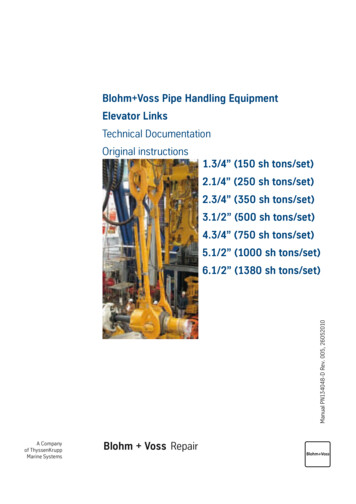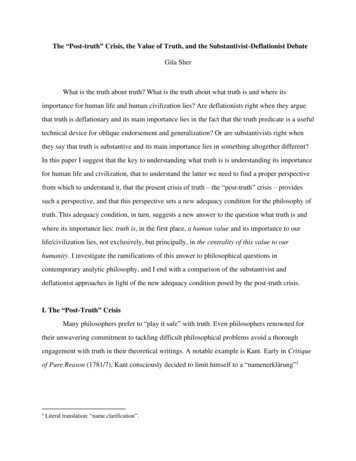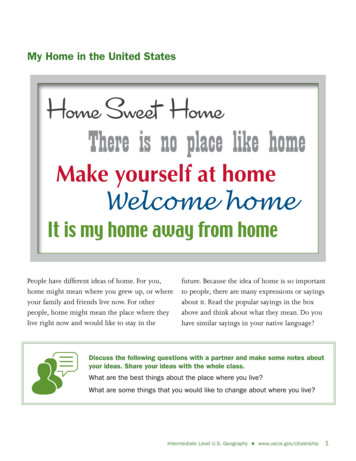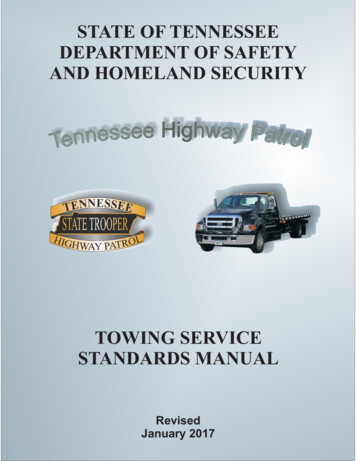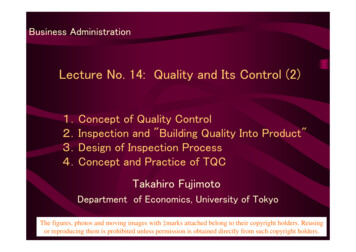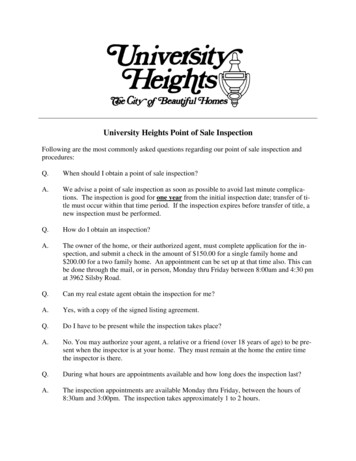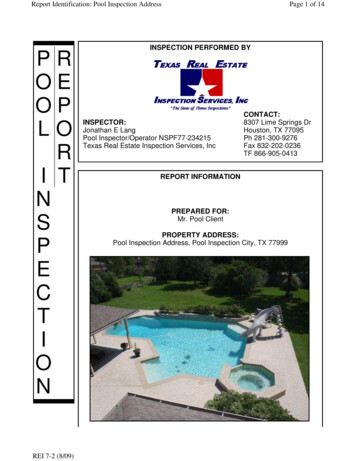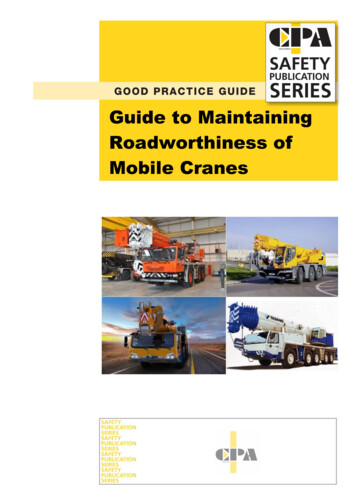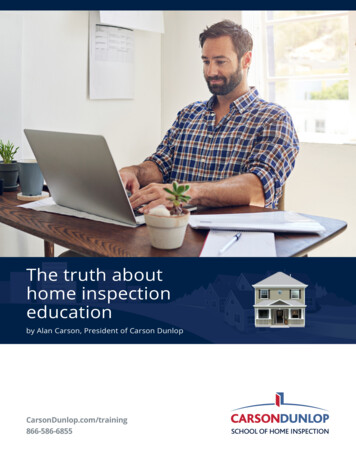
Transcription
The truth abouthome inspectioneducationby Alan Carson, President of Carson DunlopCarsonDunlop.com/training866-586-6855
The truth about homeinspection educationA WORD ABOUT HOME INSPECTIONAs most of you know, home inspection is a rewarding Professional consulting practice similar toother professions. While focused on homes, the work is similar to that of accountants, lawyers anddoctors. While many engineers and architects focus on design work, some are consultants, much likehome inspectors.Home inspection requires a broad knowledge of several house systems. It would be fair to describehome inspectors as generalists rather than specialists, just as a family doctor is a generalist, and aheart surgeon is a specialist. Good home inspectors are also good one-on-one communicators.CHARACTERISTICS OF A GOOD HOME INSPECTORSome people are naturally wired for success in home inspection. Personality traits are as important astechnical skills. While conventional wisdom is that a construction background helps people becomegood home inspectors more quickly, we have found that many people without a constructionbackground can acquire the technical skills through a good education program and apprenticeship.Even those with a construction background do not typically have the full technical skill set required ofa professional home inspector.The technical skills of home inspection can be taught, but personalities are difficult to change. Hereare some of the characteristics that make a good home inspector: A technical mind with natural curiosity – someone who likes to figure things out Enjoys meeting people – a comfortable one-on-one communicator with good listening skills Enjoys helping people – making a difference in people’s lives Organized and logical – a clear thinker who sees things through to completion Committed to continuous learning – no one knows everything! Enjoys working outside of an office – not chained to a desk, yet with no heavy labor requiredGood home inspectors have equal parts technical skills and communication skills. The communicationside includes both verbal and written skills.COPYRIGHT CARSON, DUNLOP & ASSOCIATES LTD. ALL RIGHTS RESERVED2
WHAT HOME INSPECTORS NEED TO KNOWWe have learned over 40 years that there are a number of things home inspectors need to know.When building our 10-course training program, our education design consultants forced us todetermine exactly what a competent home inspector needs to know. We were assisted in refining thisby role delineation studies and national occupational standards. Here is a heating system example: Scope of work–– What things are to be inspected What it is - component name (need to be able to recognize components)–– Furnace–– Fuel – natural gas, propane, oil, or electric?–– Mid-efficiency or high-efficiency furnace? What it does - Function–– Keep the house warm How it works–– Ignite natural gas, transfer heat indirectly to air that circulates through home, expel combustionproducts, etc. What can go wrong–– Will not start, improper operation, inadequate heat distribution, gas leaks, venting problems, etc. The implications of problems–– What it means to clients. There may be no heat for the home.–– Why does this matter? People can’t live in the home, pipes freeze, etc.–– Some problems are life threatening – fire, gas explosion or carbon monoxide poisoning for example Identifying problems–– Inspection and testing procedures–– Recognize inappropriate venting materials, configuration, termination points, etc. Recommended action–– Repair, replace, provide, clean, service, further evaluation, etc. Report writing–– Descriptions, observations and recommendations, limitations and inspection methods–– Clear, simple communication with illustrations and photosCOPYRIGHT CARSON, DUNLOP & ASSOCIATES LTD. ALL RIGHTS RESERVED3
FROM CRUDE BEGINNINGSWhen we started our home inspection business in the 1970s, there was no nationwide industry, nomarket, no demand, no training, and no mentoring. We read a few books and rode along with a fewhome inspectors in the Washington DC area who were making it up as they went along. We came backhome, applied what we knew and embarked on a journey of discovery.The more we did, the more we learned and the more we realized we did not know enough. Therewere no defined competency levels. The Standards of Practice did not, and still do not, define howinspections should be performed. We continue to learn and develop our knowledge through extensiveresearch and field experience.We saw the need to teach others. For several years in the 1990s we taught two-week programs. Werecognized the limitations of a short course, and described these as intensive introduction sessions.Those who completed these programs were clearly not ready to perform professionally.BUILDING AN EDUCATION PROGRAMI was able to step away from our home inspection business for three years to create the programin the late 1990s. Thanks to Bob Dunlop for making that possible and operating our business duringthat time!We worked with a Toronto-based education design consultant and distance education specialistsfrom Memorial University. We knew home inspection, but we were not professional educators,although we already had considerable experience training many home inspectors both inside andoutside of our firm.With expert help, we designed a distance education program first, because that is the most difficult.Distance education can be translated readily into the classroom. We concentrated on applying thebest teaching practices and focused on clear communication and effective learning. We learnedabout Bloom’s taxonomy, learning outcomes, creating fair examinations, etc. We came to understandthat learning is not memorizing. We had a clear picture that our target was mature learners, and weworked hard to avoid “textbook talk”, staying away from academic theory and formulas.We created a 10-course program focused on adult learning. The study was self-paced since we knewlearners would have varying skill and comfort levels with different parts of the program. We alsounderstood that some learners would have limited time to devote since many would be working whilethey learned. We needed a system that people could start anytime, work on their own schedule andlearn at a pace that was right for them.We knew home inspection is a visual profession so we created 1,700 illustrations. We were very luckyto work with Peter Yeates, a Carson Dunlop home inspection engineer and a graphic artist. Weincluded videos of in-field situations to provide learners some real-life experience. (This has sincebeen augmented by live webinars and Insight, our accelerated apprenticeship program.)COPYRIGHT CARSON, DUNLOP & ASSOCIATES LTD. ALL RIGHTS RESERVED4
The program was immediately adopted by Seneca College and the American Society of HomeInspectors in the United States. It is currently offered by colleges across the country.THE BENEFITS OF SELF-STUDYGiven the cost of travel, the time constraints on people, and the learning styles of adult learners,a self-study program makes perfect sense. The benefits include Start whenever you are ready. You do not have to wait for a September or January semester tobegin, for example. The ability to learn at your own speed. You can study on your schedule. Move as quickly or slowlyas you like - 2 hours a week or 40 hours a week. No travel or accommodation costs. You can learn from the comfort of your own home. Help is at hand. Instructors are available by telephone and email. Self-testing helps you insure that you are learning what you need to know, without having to worryabout marks or grades. This prepares you very well for the electronic testing which is private andprompt. You receive your results immediately. The goal is to help you succeed, not to judge you.You get the opportunity and encouragement to review and improve any weak areas.COPYRIGHT CARSON, DUNLOP & ASSOCIATES LTD. ALL RIGHTS RESERVED5
Interactive exercises and case studies help you apply what you have learned. Our accelerated apprenticeship program, available through Insight, brings the learning to life,and condenses months of difficult-to-achieve ride-along experience into hours of rich experience.Best of all, Insight is available as an app on your phone or tablet. It’s like having a mentor inyour pocket!The program has evolved and has recently been through a significant content update. The onlyconstant is change!Home inspection is a growing and evolving profession. Home inspection did not exist until the 1970s.Now roughly 75% of resale homes are inspected. Pre-listing inspections are becoming verypopular and we predict that over the next few years, home inspection will move completely froma buyer’s service to a seller’s service. The logic is compelling. This creates a significant opportunityfor new inspectors.A LITTLE MORE ON APPRENTICESHIPWe have recognized for years the challenges that new inspectors have in trying to get field experience.Home inspection is an industry where the majority of practitioners are sole proprietors.Apprenticeship models do not work very well because most sole practitioners do not want to traintheir competition. Nonetheless, this young profession has a serious problem. The first generation ofhome inspectors is winding down. This group of self-taught pioneers has accumulated considerableknowledge, much of which remains undocumented and inaccessible to the next generation.As I make presentations to groups of home inspectors across North America, I am consistentlyspeaking to a room full of people with an average age of well over 50 years. There are rarely morethan two or three people under the age of 30.We are in danger of having the first generation retire or pass away without preparing the nextgeneration and ensuring the growth of the profession. Consumers need the significant benefitsprovided by competent home inspectors.We finally have education programs available through colleges and schools. (By the way, CarsonDunlop is not only a consulting engineering company and a home inspection company; we are alsoa registered career college under the Private Career College Act, 2005.) However, almost all tradesand professions have apprenticeship, placement, internship, articling or some sort of real-worldexperiential training. Home inspection is an exception. This is a significant problem for the nextgeneration of inspectors.We have developed an apprenticeship tool called Insight to help fill the void. Like many things thesedays, it is a mobile app, suitable for use on an Apple or Android phone or tablet.It provides an accelerated apprenticeship experience offering over 13,500 photos and illustrations.The system is elegantly simple. The user can select any house component, and see a list of typicaldefects to watch for. For each defect, there are a series of photos and illustrations the learner canCOPYRIGHT CARSON, DUNLOP & ASSOCIATES LTD. ALL RIGHTS RESERVED6
look at to see what the defects look like in real life. Each photo is accompanied by a suggested reportwording to show the learner what they should tell their client.The learning curve to use the tool is short, typically less than 60 seconds. Progress bars track learners’progress, so they can see what material they have covered.This approach provides an incredible level of experience in a very short time. New inspectors can seeand learn in hours what would take months of ride-alongs to accomplish.A WORD ABOUT RIDE-ALONGSWe have been involved in a great many ride-alongs over the last 40 years. On the upside, they doprovide real-world experience. On the downside, it is hard for an individual learner to get anexperienced inspector to agree to allow them to ride along. With an industry substantially populatedby sole proprietors, we understand why people may not want to train their competition.There are other challenges to ride-alongs as well. Clearly, the inspector needs to focus on the clientwho is making a big lifestyle and financial commitment. The real estate agent and seller may alsobe there, adding complexity for the inspector. The home inspector cannot focus on the learningexperience. In most cases, the learner is not permitted to ask questions during the inspection process.Learning is entirely passive.Another challenge comes after the inspection. While learners may have many questions, the inspectortypically needs to write the inspection report promptly and get it to the client. There is often limitedopportunity and incentive for the inspector to provide a learning experience after the inspection.Another disadvantage to ride-alongs is that they do not automatically and inherently present a goodcross-section of components and conditions one might encounter. Riding along with an inspectorwho works predominantly in a suburban community with houses built after 1970 will not expose alearner to things like knob-and-tube wiring, galvanized steel supply plumbing, lead and cast-iron wasteplumbing, solid masonry construction, etc.ANOTHER USE FOR INSIGHTNo home inspector has a crystal-clear understanding of every item they will ever see as they inspectthousands of homes. The Insight app can be an instant resource on the inspector’s phone, remindingthem what to look for, confirming suspicions and helping them know what to advise clients. It’slike having a trusted advisor looking over your shoulder. Some inspectors also use the photos andillustrations in Insight to help clients understand their homes better.COPYRIGHT CARSON, DUNLOP & ASSOCIATES LTD. ALL RIGHTS RESERVED7
EDUCATION – BECAUSE KNOWLEDGE IS POWERHome inspection is a rewarding career and is more appealing now than it has ever been. Finally,there is high quality education available, combined with practical learning tools. The need for homeinspection is well recognized, the opportunity is significant, and the timing is right.To learn more and discuss whether home inspection is right for you, contact one of our careerconsultants at Carson Dunlop – 866-586-6855 or training@CarsonDunlop.com.COPYRIGHT CARSON, DUNLOP & ASSOCIATES LTD. ALL RIGHTS RESERVED8
OVER 40 YEARS IN HOME INSPECTION SERVICESaa Start your career off right with the mostrecognized training program in the countryaa A self-paced home study program –start whenever you want, work at yourown pace and on your own scheduleaa Our 10 home inspection courses are designedto give you a thorough and complete educationin all areas of the home inspection fieldCarsonDunlop.com/training866-586-6855
We knew home inspection is a visual profession so we created 1,700 illustrations. We were very lucky to work with Peter Yeates, a Carson Dunlop home inspection engineer and a graphic artist. We included videos of in-field situations to provide learners some real-life experience. (This has since



